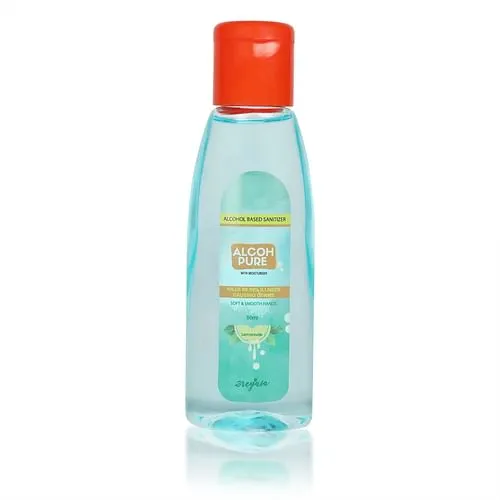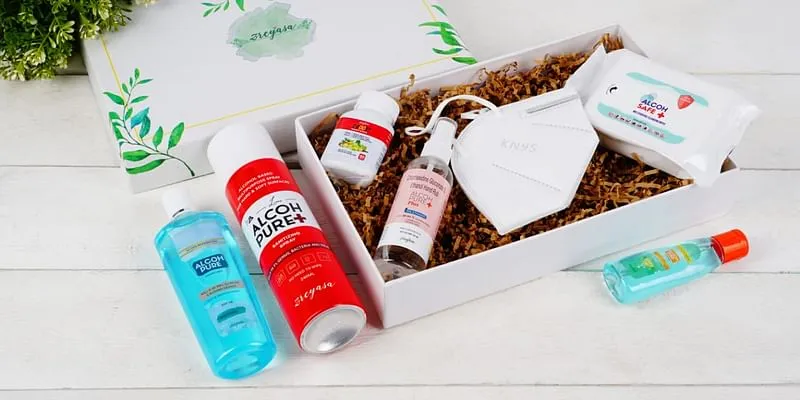This engineer built a Rs 4.3 Cr revenue business in 1 year by selling hand sanitisers amid COVID-19
In 2018, Diwaker Vasistha launched Zreyasa alongside his uncle and brother to make skincare and wellness products. The COVID-19 pandemic put a dent in his plans, leading him to manufacture and sell hand sanitisers instead.
When Diwaker Vasistha returned from Canada after his post-graduate degree in marketing and project management, he decided not to join his family’s third-party pharma manufacturing business.
His uncle Arun and brother Sidharth came from a pharma background and were deeply invested in running Vasistha Pharmaceuticals in Gurugram. But Diwaker, an engineer, did not want to get into the B2B side of the chemicals and the pharma industry.
Instead, he leveraged his family’s existing manufacturing infrastructure and expertise to launch Zreyasa, a B2C skincare, wellness, and hygiene brand, in Delhi in 2018. His uncle and brother joined him as co-founders.
“My initial plan was to launch personal care and skincare products such as soaps, lotions, etc. But when the pandemic hit, I put the personal care products on hold, and after a delay, launched hand sanitisers to meet the demand for COVID-related hygiene products,” Diwaker tells SMBStory.
He then began selling the hand sanitisers to a few corporate customers as well as end-consumers through retailers, distributors, online marketplaces, and its website. Diwaker claims Zreyasa clocked a Rs 4.3 crore revenue in FY 2020-21.

Hand sanitiser made by Zreyasa
“By outsourcing manufacturing to the family’s manufacturing units, I was able to focus purely on sales, branding and promotion, as well as better control product quality and gain an advantage in terms of price points,” Diwaker says.
Challenges in manufacturing
Although the demand for hand sanitisers skyrocketed during the pandemic, it was not easy for Diwaker and his brand to make and sell them.
Amid the sharp rise in the price of hand sanitisers between late March to June 2020, the Delhi government capped the MRP of such products at Rs 100 per 200 ml bottle.
“For hand sanitiser businesses, it was difficult to manufacture with limited workforce and within the price range specified by the government so that the products weren't sold at a loss. Further, selling on ecommerce marketplaces involved a commission. We were able to address all these challenges by optimising our costs,” Diwaker says, explaining:
“As we outsourced manufacturing, we didn’t have to invest in machinery. Further, our family’s manufacturing plants already had the required licenses for making alcohol-based products such as hand sanitisers. We also optimised costs by purchasing raw materials in bulk, selling directly to consumers, and splitting transportation costs with them.”
During the first few months of the pandemic, Zreyasa and the third-party manufacturing units also experienced labour shortages as migrant workers returned to their hometowns.
“Many went back during both waves. But we realised that those coming to work were still unsafe since they could contract the virus during their commutes. So, we began providing housing and food near the manufacturing units. Although only 30-40 percent of the workforce was present initially, the situation improved over the months as we also trained new people,” Diwaker says.
Future plans amidst a growing market
The hand sanitiser market in India reached a value of $123.5 million in 2020, and although it is expected to see minor deceleration this year, its overall is expected to grow at a CAGR of around 13 percent during 2021-2026.
Key players include ITC (which owns Savlon), Reckitt Benckiser (which owns Dettol), Dabur, Hindustan Unilever, The Himalaya Drug Company, and others.
Diwaker believes Zreyasa can compete in the same market as these established giants as his brand leverages manufacturing infrastructure that has been built and invested in for over 30 years by the Vasistha family.

Zreyasa's product range
“In addition to this, people’s preferences for hand sanitisers and other hygiene products can vary based on subjective things such as the fragrance of the product. And not everyone wants the same amount of alcohol used in the product,” Diwaker says, adding:
“So there is room for players like us – and we can thrive as long as we continue to display our products well and build a one-stop-shop for hygiene products.” In keeping with this, Zreyasa added N95 masks, antiseptic lotions, multipurpose disinfectant sprays, and vegetable and fruit washes to its product portfolio.
Diwaker believes these products will continue to see demand even as the pandemic subsidies. Going forward, he also plans to get back on track with his original plans to launch skincare and wellness products. “Our skincare portfolio is in progress and in the next couple of months, we expect to launch a few products,” he adds.
Edited by Kanishk Singh








